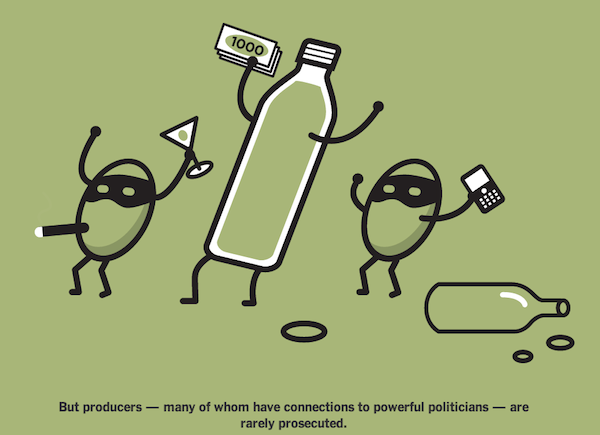
It’s no small secret the New York Times is trying to expand its multimedia efforts across all sections. They’re producing the Times Minute, a brief news recap, as well as features videos, summaries, and short features in Op-Docs.
That also includes animation. Today the Times is out with “Extra Virgin Suicide,” a fun animated story by Nicholas Blechman in the Opinions section, that looks at the how Italian olive oil is produced. This isn’t the first time animation has appeared on the opinion page. Blechman’s story is subtle, playing inside your browser window instead of a video player, with an aesthetic that feels like a cartoon combined with an infographic. Turns out all Italian olive oil may, in fact, not always Italian.
Update, Jan. 31: As commenter Married to Italy notes below, there was a fairly significant error in this graphic which the Times had to correct — details here. (That link’s in Italian, but even if you don’t speak it, it has screenshots of the before/after.) There’s no obvious indication on the graphic that it’s been corrected.
3 comments:
By the way, there’s a pretty big fallout here in Italy about this controversial infographic that makes it seem like all Italian olive oil is tainted.. They’ve already had to change a few of the phrases, most notably the one smearing the credibility of the “Made in Italy” label. Does it cease to fall under the same standards of ethical journalism just because it’s graphic instead of an article? It’s an interesting subject… graphics in journalism.
http://marriedtoitaly.com/2014/01/29/olive-oil-like-a-virgin-in-italy/
httpNY Times Olive Oil Fraud Infographic Timeline
://www.oliveoiltimes.com/ny-times-olive-oil-fraud-infographic-timeline
NY Times Olive Oil Fraud Infographic Timeline http://www.oliveoiltimes.com/ny-times-olive-oil-fraud-infographic-timeline
Trackbacks:
Leave a comment